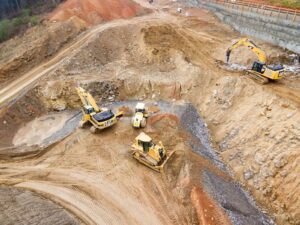Planning permission for a new fossil fuel operation in Surrey should not have been approved due to the profound implications for countryside and climate, according to a judgement on Thursday 20th June.
Local resident Sarah Finch, acting on behalf of Weald Action Group, brought the case against Surrey County Court with support from Friends of the Earth. The charity acted as a legal intervener.
The local authority had given the go-ahead to the proposal on land close to Gatwick Airport, a move which the claimant argued reflected a failure to conduct an effective environmental impact assessment. Central to this was the council’s own 2019 declaration of a climate emergency due to the impacts of burning oil and ‘downstream’ scope 3 emissions.
Had a rigorous analysis been carried out, it is argued, then it would not be possible to grant planning permission for drilling four new wells in a field which The Guardian, reporting back in 2015, claimed could contain up to 100 billion barrels of black gold. This could produce some 10million tonnes of carbon emissions once burnt.
Meanwhile, the fact the judge made the ruling in part due to the ‘climate emergency declaration’ sets a new precedent others are likely to try and model. Currently, 95% of Great Britain’s population lives in an area that has made the same declaration, with more than 570 councils effectively stating they cannot ethically greenlight projects which contribute to climate change.
Other developments, including a new coal mine in Cumbria and the Rosebank oil field in the North Sea, could now be at risk of having consent removed based on the same criteria. Both are subject to legal challenges, which have been significantly strengthened based on today’s judgement. According to Friends of the Earth, the landmark ruling means:
- The landscape around the granting of planning permission for fossil fuel extraction has been fundamentally changed.
- Going forwards, it will be harder for fossil fuel developers to get consent for their projects. The judgment is very clear that the inevitability of the end-use emissions of this oil project meant they were indirect effects of the development, and so needed to be factored into the environmental impact assessment. As is recorded in the Supreme Court’s judgment: ‘The whole purpose of extracting fossil fuels is to make hydrocarbons available for combustion’.
- In giving the majority judgment, Lord Leggatt said: ‘I do not accept the premise that it would be wrong for a local planning authority, in deciding whether to grant planning permission, to take into account the fact that the proposed use of the land is one that will contribute to global warming through fossil fuel extraction.’
- The government’s controversial decision to give the go-ahead to a new coal mine in Cumbria in December 2022 could well be impacted. The carbon emissions from burning the extracted coal were not included in the developer’s environmental statement. Friends of the Earth and local campaign group South Lakes Action on Climate Change (SLACC) have brought legal challenges to the Secretary of State’s decision in the High Court, which will take place on 16-18 July 2024.
- Uplift and Greenpeace are challenging the government’s decision to allow development of Rosebank, the UK’s largest untapped North Sea oilfield, which could also be impacted.
‘Gas, oil and coal companies have been fighting tooth and nail to avoid having to account for all the climate-harming emissions their developments cause. Now, the highest court in the country has ruled that planning permission for an oil project was granted unlawfully because there was no consideration of its full climate impact,’ said Friends of the Earth lawyer, Katie de Kauwe.
‘This judgment will make it harder for new fossil fuel projects to go ahead,’ she added. ‘They can no longer claim that downstream emissions are someone else’s problem. Now, when fossil fuel companies apply for planning permission, it follows from the Supreme Court’s judgment, that the end-use emissions must be considered by the planning authority.’

















